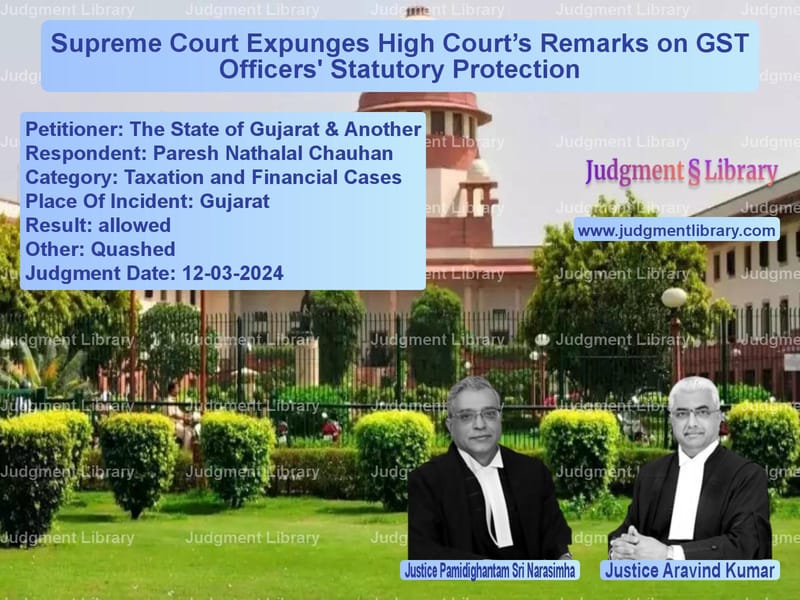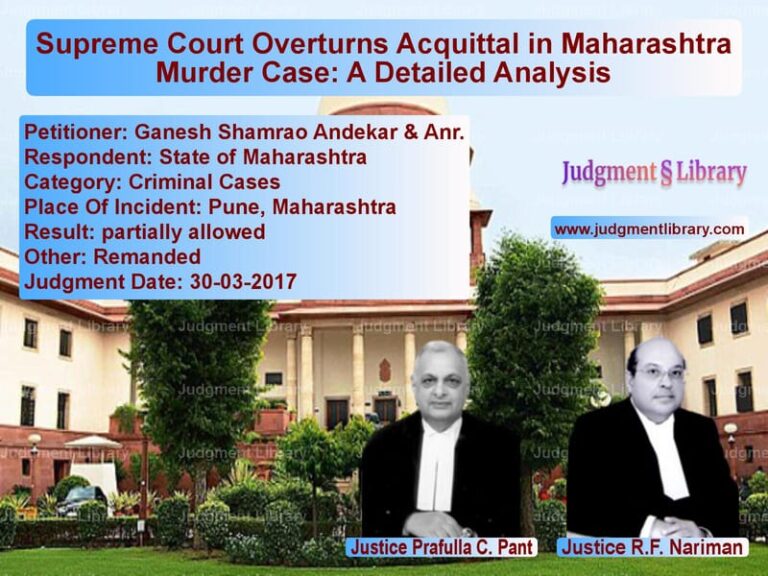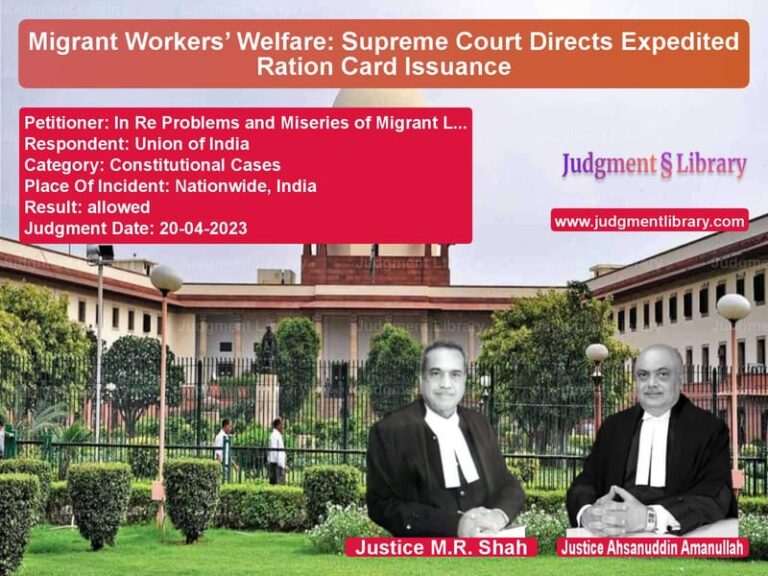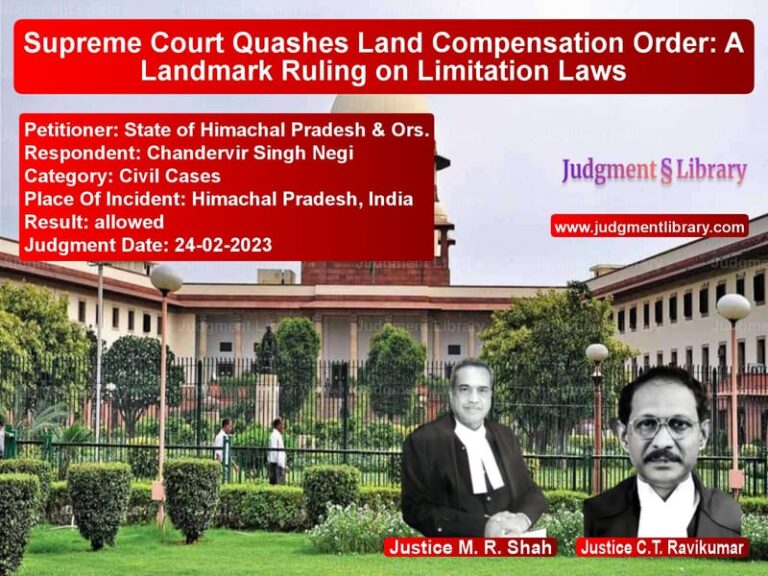Supreme Court Expunges High Court’s Remarks on GST Officers’ Statutory Protection
The Supreme Court of India recently expunged a portion of a Gujarat High Court order that had questioned the applicability of the statutory protection available to GST officers under Section 157 of the GST Act. The case, The State of Gujarat & Another vs. Paresh Nathalal Chauhan, involved a challenge to the High Court’s interim observations which implied that GST officers might not be entitled to protection under the law when carrying out their duties.
Background of the Case
The dispute originated from a writ petition filed by Paresh Nathalal Chauhan before the Gujarat High Court, seeking protection from arrest under Section 69 read with Section 132 of the GST Act. The case involved allegations of prolonged and unauthorized stay by GST officers at the petitioner’s residence during an investigation.
The High Court passed an interim order in favor of the petitioner, stating that the GST officers’ actions were unauthorized and illegal. While granting relief to Chauhan, the High Court also made certain remarks questioning whether Section 157 of the GST Act— which provides protection to officers acting in good faith—could be applied in such cases.
Key Observations of the Gujarat High Court
In its order, the High Court made the following crucial remarks:
“An action like the present one which is not contemplated under any statutory provision and which infringes the fundamental rights of citizens under Article 21 of the Constitution of India may not be protected under this section.”
The court further stated:
“An action taken may be said to be in good faith if the officer is otherwise so empowered and he exceeds the scope of his authority. However, in a case like the present one where the authorization was for search and seizure of goods liable to confiscation, documents, books, or things, and the concerned officer converted it into a search for a person and an investigation, which is not otherwise backed by any statutory provision, it may be difficult to accept that such action was in good faith.”
State’s Appeal to the Supreme Court
The State of Gujarat and GST authorities filed an appeal before the Supreme Court, arguing that:
- The High Court’s remarks were premature and prejudged the issue of officers’ statutory protection.
- The observations created an impression that GST officers would not be entitled to claim immunity under Section 157 in future proceedings.
- Since the High Court had not yet decided on the writ petition, such remarks were unnecessary and could influence any future litigation against the officers.
Supreme Court’s Analysis
The Supreme Court examined the issue in the context of statutory protection clauses and judicial review. The key points discussed in the judgment were:
1. Nature and Purpose of Section 157 of the GST Act
The Court reiterated that provisions like Section 157 exist to protect officers performing their duties in good faith. Such protection is necessary to prevent frivolous lawsuits that could hinder law enforcement.
“A good faith clause in a statute will therefore be a defense. If successfully pleaded, it not only legitimizes the action but also protects the statutory functionary from any legal action.”
2. High Court’s Remarks as Premature
The Supreme Court found that the Gujarat High Court’s statements were not based on an actual case against the officers. Instead, they were made in anticipation of possible future legal action.
“We are of the opinion that these observations are in the nature of advance rulings. If such observations remain, they will affect the integrity and independence of that adjudication, compromising the prosecution and the defense equally.”
3. Court’s Role in Determining ‘Good Faith’
The Supreme Court clarified that the determination of whether an officer acted in good faith should be made in specific legal proceedings against them and not in an interim order unrelated to any such proceedings.
“The scrutiny of whether the act is done in good faith or not would depend upon the facts and circumstances of each case.”
Final Verdict
The Supreme Court ruled that the Gujarat High Court’s remarks in paragraph 28 of its order were legally inappropriate. It expunged those observations, stating:
“In view of the above, we expunge paragraph 28 and dispose of the appeal.”
Conclusion
The Supreme Court’s ruling reinforces important principles regarding the judicial interpretation of statutory protections:
- Courts should avoid making premature observations that might influence future proceedings.
- The determination of good faith under Section 157 should be done only in specific legal cases and not as a general remark.
- Government officers need statutory protection to perform their duties without fear of unnecessary litigation.
- The balance between protection of officers and ensuring accountability should be maintained through case-by-case judicial scrutiny.
This judgment ensures that GST officers can continue their enforcement duties without undue fear of litigation while also affirming that any alleged misuse of power will be subject to judicial review.
Petitioner Name: The State of Gujarat & Another.Respondent Name: Paresh Nathalal Chauhan.Judgment By: Justice Pamidighantam Sri Narasimha, Justice Aravind Kumar.Place Of Incident: Gujarat.Judgment Date: 12-03-2024.
Don’t miss out on the full details! Download the complete judgment in PDF format below and gain valuable insights instantly!
Download Judgment: the-state-of-gujarat-vs-paresh-nathalal-chau-supreme-court-of-india-judgment-dated-12-03-2024.pdf
Directly Download Judgment: Directly download this Judgment
See all petitions in GST Law
See all petitions in Banking Regulations
See all petitions in Judgment by P.S. Narasimha
See all petitions in Judgment by Aravind Kumar
See all petitions in allowed
See all petitions in Quashed
See all petitions in supreme court of India judgments March 2024
See all petitions in 2024 judgments
See all posts in Taxation and Financial Cases Category
See all allowed petitions in Taxation and Financial Cases Category
See all Dismissed petitions in Taxation and Financial Cases Category
See all partially allowed petitions in Taxation and Financial Cases Category







